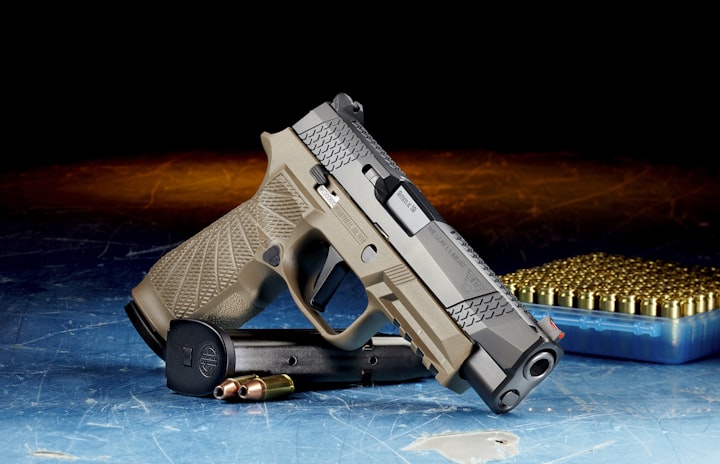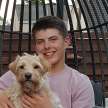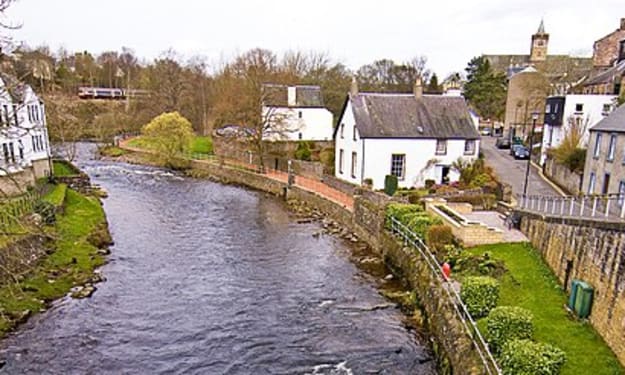The Fears We Face
What cops should dream to be

I’m afraid of knives.
I’m afraid of drowning.
I’m afraid of being outnumbered.
I’m afraid of being wrongly accused.
I’m afraid of what people can do to a child.
I’m afraid of a baseball bat in the hands of a drunk.
I’m afraid of what I might find in a house that smells bad.
I’m afraid when someone puts a match to their petrol soaked top.
I’m afraid when driving fast to the scene of a pileup on a motorway.
I've faced all those fears. I was a cop for 30 years. As a Scottish police officer, I didn’t carry a firearm. I had no need. Yes, we had incidents, but they were so rare they didn't sit in our psyche.
We are fortunate in the UK, compared to the US our gun culture is non-existent. It’s 25 years since the Dunblane massacre. Laws changed and owning a handgun came under even stricter controls.
Many Americans would consider this a knee-jerk reaction. I understand where that comes from. I understand that in the US the gun issue is far more emotive than in the UK. The sense of entitlement to own weapons is deeper than a love heart etched into a tree.
The UK has a simplistic view. We changed the laws and we haven’t had a school shooting since — we’ve had no mass shootings at all.
That didn’t stop me from being wary when I stopped a car or pulled up outside a bar fight. I never knew what I would find. But, I can’t imagine how much more frightened I’d be if I had been a cop in America.
Imagine the stretched sinews in my neck if I thought the guy I stopped for not having a licence plate might kill me?
As a rookie cop, standing to attention on the parade square at the Scottish Police College, I vowed that the day they give me a gun is the day I hang up my badge.
For all those fears I faced, I feared killing someone more.
This isn’t about gun control
It’s about being human and it’s about the fears humans face. Cops are human.
Civil rights attorney, Constance Rice, said it best.
“Cops can get into a state of mind where they’re scared to death. When they’re in that really, really frightened place they panic and they act out on that panic. I have known cops who haven’t had a racist bone in their bodies and in fact had adopted black children, they went to black churches on the weekend; and these are white cops. They really weren’t overtly racist. They weren’t consciously racist. But you know what they had in their minds that made them act out and beat a black suspect unwarrantedly? They had fear. They were afraid of black men. I know a lot of white cops who have told me. And I interviewed over 900 police officers in 18 months and they started talking to me, it was almost like a therapy session for them I didn’t realize that they needed an outlet to talk.”
Back in the 80s, the chief of the Los Angeles Police Department (LAPD), Daryl Gates, waged a paramilitary-style assault on gangs, deploying programs with names like C.R.A.S.H. and Operation Hammer. And while it led to thousands of arrests, it also drew thousands of claims against the police for excessive force.
The LAPD could be brutal in those days. Pulling people over, beating them, and humiliating them. Yes, in the black community.
Constance Rice filed lawsuits, took the cops to court — and won. Then, one day, she stopped.
Despite racking up over $1.6 billion dollars in damages against the police department, she realised that, for all her successful litigation, it wasn’t changing a damn thing.
People were still killing each other. Cops were in the middle of it and they were scared. No amount of arrests stopped the violence. America needed a different solution.
A new dynamic
Constance Rice came to an extraordinary conclusion, an epiphany if you like. In place of lawsuits, “We’re going to solve this by empathising,” she said. ”We’re going to solve it with compassion and we’re going to solve it with common sense.”
What does that look like in the stations, streets and ghettos? How do you operate with empathy and compassion in the face of bullets and bravado?
For Rice, the first step was listening.
For two years, she listened to hundreds of police officers. “It was almost like a therapy session for them,” she said. And what she heard from these men — these urban warriors — was fear.
“Ms. Rice I’m scared of black men. Black men terrify me. I’m really scared of them. Ms. Rice, you know black men who come out of prison, they’ve got great hulk strength and I’m afraid they’re going to kill me. Ms. Rice, can you teach me how not to be afraid of black men.”
Does all racism stem from fear?
Rice responded with acknowledgement and forbearance. She listened without judgement. She empathised with the tough job they faced. She understood they were human, and it is part of the human condition to be wary of people who are not part of your tribe.
She had to build trust before being able to influence their behaviour.
She changed their incentives.
“You are no longer in the arrest business;” she told them, “you are in the trust business. You will not get promoted based on the number of arrests you make, because that’s what destroys trust. Instead, you will build trust through service.”
So, the police went back into the black housing projects. They handed out pairs of bifocals for the elderly. They brought in doctors and medical equipment, and computers for kids. They set up and took part in youth sports programs and health screenings.
And that new level of familiarity changed police attitudes.
Once you know someone by their first name, you can talk to that person. You can break bread with that person, you can throw balls with that person. Once you do that, you can relax around that person, you will not fear him anymore.
And that is how they did it.
The cops became less fearful, and the community embraced them. That type of policing is more effective, it’s cheaper, and it reduces crime.
Why are Americans still killing each other?
Fear. It’s because of fear. America is still fearful. Cops reflect society and if society is scared, cops reflect that fear.
It’s an emotive subject. The generally held view is: All cops are bastards, all cops are racists, all cops can’t be trusted.
Ask yourself, ‘why?’
When was the last time you read a good news story about cops?
Cops feed homeless man from their own lunchboxes. Cop adopted an abused 10-year-old boy and his baby sister.
Cops do good work every day. They guard, watch, and patrol to preserve life and protect their communities. Sometimes they make the ultimate sacrifice in the line of duty. Most of these good deeds aren’t newsworthy.
The news is a continuous feed of gang violence, killings, cop brutality, disasters and mayhem. It’s a diet of fear.
Leaders want to be re-elected, so they play on that fear. Politicians don’t want to be seen to be soft on crime, that doesn’t gain them any votes.
When your candidate in the next election trots out, ‘We are the party to be tough on crime,’ then you go ahead and vote for him — you will be flushing your money down the drain.
They aren’t being tough on crime, they are being easy on stupidity.
We often ignore empathy and compassion as tools of the trade. We think of them as a sign of weakness.
In America, they train the Police to put out fires by pissing on them. It’s no surprise the people sitting around the campfire get smoke in their eyes.
The fact is police everywhere show prejudice and bias. Whether it be conscious racism or unconscious bias. Those who have negative encounters with the police tar all police officers with the same colour of white.
The suspicion, contempt or downright hatred for the police instils a backs-to-the-wall stance in police officers. In the UK, the first rule of policing is to protect life. In America, the first rule of policing is to go home at the end of your shift.
Police training teaches officers to be afraid. They emphasise how incredibly dangerous policing is as a profession. They train officers to view every encounter as a potential deadly force incident.
They give American police an average of sixty hours of training in the use of deadly force — which involves firearms. A further sixty hours of training is on self-defence. Compare that to de-escalation and conflict resolution — the average is only eight hours.
American cops fall back on their physical skills training when they face unpredictable situations. It is what they are more comfortable with.
In the UK, there is no routine firearm training for new recruits.
Emotional intelligence can be powerful
Constable Sylvester and I arrested Gibson. Gibson was the vilest human being I came across in my service. He did despicable things to other people. On this occasion, he punched an elderly lady neighbour.
On the journey back to the office, Gibson kept up a torrent of verbal abuse and directed it all at Constable Sylvester.
He said things about Sylvester, his wife, his children and his mother that would spur any lesser man to stop the car take him out and give him a hiding.
Not Sylvester, he didn’t let Gibson rile him. You could say anything to Constable Sylvester and he’d shrug it off. He was the most effective person I know at controlling his temper.
At the office, Gibson continued his tirade of abuse. He struggled, he spat, he cursed and swore until we got him into a cell.
“Aye, so are you going to give me a doing over now, are you?”
Gibson expected us to take it out on him. What he said would rile a nun into retaliation.
“Oh no,” said Sylvester. “Once you calm down, we’ll come back with a cup of tea for you, and we’ll just go through the process of getting you charged, okay?”
A kind, calm attitude is more powerful than handcuffs and batons. And it can be learned. States which train their officers to use contrary methods to deadly force show fewer incidences of civilian and police deaths.
The big question
Connie Rice understood why people were angry.
“They should be angry,” she said. “And they should be outraged. And if you are a relative of someone who’s been murdered under these circumstances, there is nothing that can contain your rage. I understand that. I completely get that. And once you have expressed that rage, you really have to ask yourself, ‘What’s gonna really prevent this from happening again?’”
Has anything changed since Connie Rice asked this in the 80s?
If I am right and it is fear that differentiates British cops from American cops then the solution should be to remove that fear — which is an oversimplification, I know.
Humans are complicated. We are a mix of nature and nurture. Poverty, experiences, influences, mental health, misunderstandings and moods all play a part in any situation.
Crime is not unique to the US, Britain has their own issues: Drugs, drunkenness, knife crime, and police violence. There are rotten apples in the ranks and miscarriages of justice. Britain is not immune. However, they are not routinely armed. A baton, handcuffs, and pepper spray are much less lethal solutions.
With the population less likely to be carrying a deadly weapon, officers are much less fearful. You can approach a cop anywhere in the UK and ask them for directions. The likelihood is you will get a polite response.
Most encounters benefit from negotiation. Conflict resolution, de-escalation and a little empathy are more powerful tools in keeping the police and public safe than a Smith & Wesson.
I have a dream. I dream we can get the message across to cops everywhere. I dream that the culture is set correctly at the top and that it floods every single person entrusted with a badge.
Show by example. Let cops see and hear what they should be saying.
What cops should dream to be
I’m not afraid to show empathy and compassion for my fellow human.
I’m not afraid to see the situation from someone else’s perspective.
I’m not afraid to listen to another person’s point of view.
I’m not afraid of pointing out unjustified conclusions.
I’m not afraid to challenge a lack of evidence.
I’m not afraid to challenge our injustice.
I’m not afraid to challenge racism.
I’m not afraid to seek the truth.
I’m not afraid to police fairly.
I’m not afraid of you.
About the Creator
Malky McEwan
Curious mind. Author of three funny memoirs. Top writer on Quora and Medium x 9. Writing to entertain, and inform. Goal: become the oldest person in the world (breaking my record every day).






Comments
There are no comments for this story
Be the first to respond and start the conversation.